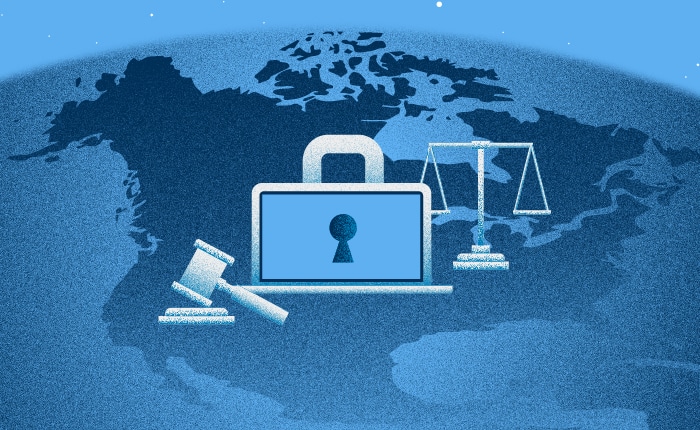Kicking off with Understanding Data Privacy Laws, this topic delves into the crucial aspects of data protection in the digital era. From regulations to compliance, get ready to explore how these laws impact individuals and organizations alike.
Introduction to Data Privacy Laws

In today’s digital age, data privacy laws play a crucial role in safeguarding sensitive information and upholding individuals’ rights to privacy. These laws are designed to regulate the collection, use, and sharing of personal data to ensure transparency and accountability in how organizations handle data.
Key Objectives of Data Privacy Laws
- Protecting individuals’ personal information from unauthorized access or misuse.
- Establishing guidelines for organizations on data collection, processing, and storage.
- Empowering individuals to control their own personal data and make informed decisions about its use.
Impact of Data Privacy Laws
Data privacy laws have a significant impact on both individuals and organizations. For individuals, these laws provide a sense of security and assurance that their personal information is being handled responsibly. On the other hand, organizations are required to comply with these laws to avoid legal repercussions and maintain trust with their customers. Overall, data privacy laws help create a more transparent and secure digital environment for everyone involved.
Major Data Privacy Regulations
Data privacy regulations play a crucial role in protecting individuals’ personal information and ensuring that companies handle data responsibly. Some of the most prominent data privacy regulations include GDPR, CCPA, and HIPAA.
General Data Protection Regulation (GDPR)
The GDPR is a regulation in EU law that focuses on data protection and privacy for all individuals within the European Union and the European Economic Area. It sets guidelines for the collection and processing of personal information, giving individuals more control over their data.
California Consumer Privacy Act (CCPA)
CCPA is a state statute that enhances privacy rights and consumer protection for residents of California. It grants consumers greater transparency and control over their personal information held by businesses. CCPA requires businesses to disclose data collection and sharing practices and allows consumers to request the deletion of their data.
Health Insurance Portability and Accountability Act (HIPAA)
HIPAA is a federal law in the United States that establishes data privacy and security requirements for safeguarding medical information. It sets standards for the protection of sensitive patient data and ensures the confidentiality of healthcare information.
Data breaches and privacy incidents have significantly influenced the development of these laws. For example, the Cambridge Analytica scandal in 2018, where personal data of millions of Facebook users was harvested without consent, played a role in shaping the GDPR. Similarly, numerous healthcare data breaches led to the implementation of HIPAA to protect sensitive medical information.
Compliance and Enforcement

In today’s digital age, organizations face numerous challenges when it comes to complying with data privacy laws. As technology advances and data collection becomes more prevalent, ensuring compliance with these regulations is crucial to protect individuals’ personal information.
Challenges in Compliance
- Understanding and keeping up with evolving data privacy laws and regulations can be daunting for organizations, especially those operating in multiple jurisdictions.
- Implementing robust data protection measures to secure sensitive information while also ensuring data accessibility for authorized personnel.
- Balancing the need for data analytics and innovation with the requirement to protect personal data and uphold privacy rights.
Penalties for Non-compliance
- Non-compliance with data privacy regulations can result in hefty fines, reputational damage, and legal action against the organization.
- Penalties for non-compliance vary depending on the severity of the breach and the specific regulations violated, with fines reaching millions of dollars in some cases.
- In addition to financial penalties, organizations may also face operational restrictions, sanctions, or even criminal charges for serious violations of data privacy laws.
Best Practices for Compliance
- Conducting regular privacy impact assessments to identify and mitigate risks associated with data processing activities.
- Implementing robust data protection measures, such as encryption, access controls, and data minimization, to safeguard personal information.
- Providing ongoing training and awareness programs for employees to ensure they understand their responsibilities in protecting data privacy.
International Perspectives on Data Privacy Laws: Understanding Data Privacy Laws
When it comes to data privacy laws, different countries have varying regulations in place to protect the personal information of their citizens. These laws dictate how data can be collected, stored, and used by organizations operating within their borders.
Variation in Data Privacy Laws, Understanding Data Privacy Laws
Across the globe, countries have their own unique set of data privacy laws that reflect their cultural values, legal systems, and technological capabilities. For example, the European Union’s General Data Protection Regulation (GDPR) is known for its strict requirements on data protection, while countries like the United States have a more sectoral approach to data privacy regulation.
Implications of Cross-Border Data Transfers
With the rise of globalization and digital connectivity, cross-border data transfers have become increasingly common. However, the transfer of personal data across international boundaries can raise concerns about data privacy and security. Different countries may have different standards for data protection, leading to potential conflicts when data is transferred between jurisdictions.
Harmonization of Data Privacy Regulations
Efforts are being made to harmonize data privacy regulations globally to address the challenges posed by cross-border data transfers. International organizations and agreements, such as the Asia-Pacific Economic Cooperation (APEC) Privacy Framework and the Council of Europe’s Convention 108, aim to establish common principles and standards for data protection that can be adopted by countries around the world.
Future Trends in Data Privacy
As technology continues to advance at a rapid pace, data privacy laws are likely to evolve to keep up with these changes. One key area of focus will be the role of artificial intelligence in shaping data privacy regulations. As AI becomes more prevalent in processing and analyzing vast amounts of data, there will be a growing need to ensure that privacy rights are protected.
Impact of Artificial Intelligence
Artificial intelligence has the potential to revolutionize the way data is handled, leading to more efficient data processing and analysis. However, AI also poses significant challenges to data privacy, as it can potentially infringe on individuals’ privacy rights through invasive data collection and profiling. This will necessitate the development of new regulations to address these concerns and protect individuals’ privacy in the age of AI.
Emerging Issues in Data Privacy
With the rise of new technologies such as IoT devices, biometric data collection, and facial recognition systems, new privacy concerns are emerging that may require updated legislation. Issues such as data breaches, algorithmic bias, and the use of personal data for targeted advertising are becoming more prevalent, highlighting the need for robust data privacy laws to safeguard individuals’ information.
Global Cooperation and Harmonization
In an increasingly interconnected world, data flows across borders, making it essential for countries to work together to establish harmonized data privacy regulations. International cooperation will be crucial in addressing global data privacy challenges and ensuring that individuals’ privacy rights are protected regardless of where they are located.
